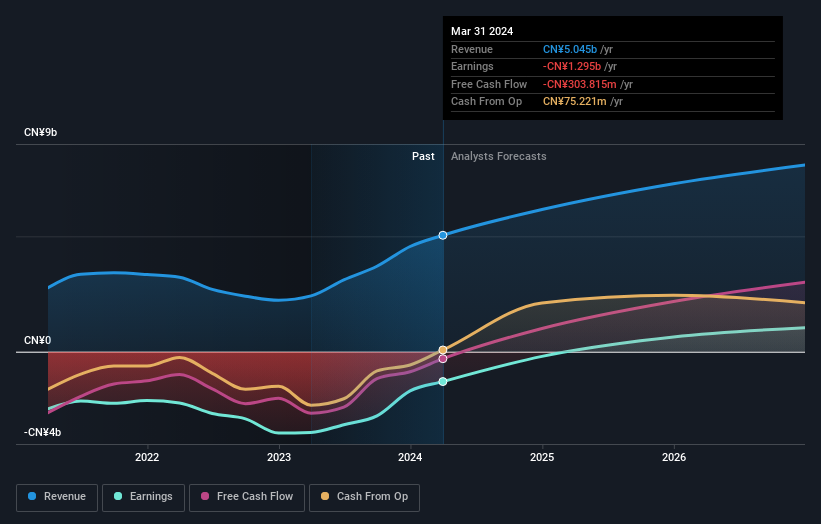- Hong Kong
- /
- Infrastructure
- /
- SEHK:694
Beijing Capital International Airport Company Limited's (HKG:694) 6.0% loss last week hit both individual investors who own 59% as well as institutions

Key Insights
- The considerable ownership by private companies in Beijing Capital International Airport indicates that they collectively have a greater say in management and business strategy
- The largest shareholder of the company is Capital Airports Holdings Co.,Ltd. with a 59% stake
- Institutional ownership in Beijing Capital International Airport is 30%
To get a sense of who is truly in control of Beijing Capital International Airport Company Limited (HKG:694), it is important to understand the ownership structure of the business. With 59% stake, private companies possess the maximum shares in the company. In other words, the group stands to gain the most (or lose the most) from their investment into the company.
While the holdings of private companies took a hit after last week’s 6.0% price drop, institutions with their 30% holdings also suffered.
Let's take a closer look to see what the different types of shareholders can tell us about Beijing Capital International Airport.
See our latest analysis for Beijing Capital International Airport

What Does The Institutional Ownership Tell Us About Beijing Capital International Airport?
Institutions typically measure themselves against a benchmark when reporting to their own investors, so they often become more enthusiastic about a stock once it's included in a major index. We would expect most companies to have some institutions on the register, especially if they are growing.
We can see that Beijing Capital International Airport does have institutional investors; and they hold a good portion of the company's stock. This can indicate that the company has a certain degree of credibility in the investment community. However, it is best to be wary of relying on the supposed validation that comes with institutional investors. They too, get it wrong sometimes. When multiple institutions own a stock, there's always a risk that they are in a 'crowded trade'. When such a trade goes wrong, multiple parties may compete to sell stock fast. This risk is higher in a company without a history of growth. You can see Beijing Capital International Airport's historic earnings and revenue below, but keep in mind there's always more to the story.

Hedge funds don't have many shares in Beijing Capital International Airport. Capital Airports Holdings Co.,Ltd. is currently the largest shareholder, with 59% of shares outstanding. This implies that they have majority interest control of the future of the company. Meanwhile, the second and third largest shareholders, hold 3.3% and 2.5%, of the shares outstanding, respectively.
Researching institutional ownership is a good way to gauge and filter a stock's expected performance. The same can be achieved by studying analyst sentiments. There are a reasonable number of analysts covering the stock, so it might be useful to find out their aggregate view on the future.
Insider Ownership Of Beijing Capital International Airport
The definition of company insiders can be subjective and does vary between jurisdictions. Our data reflects individual insiders, capturing board members at the very least. Company management run the business, but the CEO will answer to the board, even if he or she is a member of it.
I generally consider insider ownership to be a good thing. However, on some occasions it makes it more difficult for other shareholders to hold the board accountable for decisions.
Our most recent data indicates that insiders own less than 1% of Beijing Capital International Airport Company Limited. But they may have an indirect interest through a corporate structure that we haven't picked up on. It's a big company, so even a small proportional interest can create alignment between the board and shareholders. In this case insiders own HK$36m worth of shares. Arguably, recent buying and selling is just as important to consider. You can click here to see if insiders have been buying or selling.
General Public Ownership
With a 11% ownership, the general public, mostly comprising of individual investors, have some degree of sway over Beijing Capital International Airport. This size of ownership, while considerable, may not be enough to change company policy if the decision is not in sync with other large shareholders.
Private Company Ownership
We can see that Private Companies own 59%, of the shares on issue. It's hard to draw any conclusions from this fact alone, so its worth looking into who owns those private companies. Sometimes insiders or other related parties have an interest in shares in a public company through a separate private company.
Next Steps:
While it is well worth considering the different groups that own a company, there are other factors that are even more important. For instance, we've identified 1 warning sign for Beijing Capital International Airport that you should be aware of.
If you are like me, you may want to think about whether this company will grow or shrink. Luckily, you can check this free report showing analyst forecasts for its future.
NB: Figures in this article are calculated using data from the last twelve months, which refer to the 12-month period ending on the last date of the month the financial statement is dated. This may not be consistent with full year annual report figures.
Valuation is complex, but we're here to simplify it.
Discover if Beijing Capital International Airport might be undervalued or overvalued with our detailed analysis, featuring fair value estimates, potential risks, dividends, insider trades, and its financial condition.
Access Free AnalysisHave feedback on this article? Concerned about the content? Get in touch with us directly. Alternatively, email editorial-team (at) simplywallst.com.
This article by Simply Wall St is general in nature. We provide commentary based on historical data and analyst forecasts only using an unbiased methodology and our articles are not intended to be financial advice. It does not constitute a recommendation to buy or sell any stock, and does not take account of your objectives, or your financial situation. We aim to bring you long-term focused analysis driven by fundamental data. Note that our analysis may not factor in the latest price-sensitive company announcements or qualitative material. Simply Wall St has no position in any stocks mentioned.
About SEHK:694
Beijing Capital International Airport
Engages in the aeronautical and non-aeronautical businesses at the Beijing Capital Airport in the People’s Republic of China.
Reasonable growth potential and slightly overvalued.


